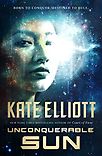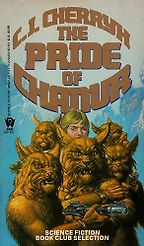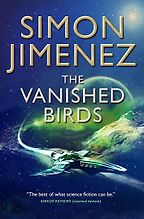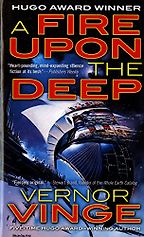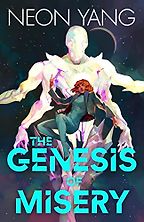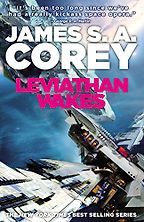You write in a number of genres. Might you quickly outline the idea of ‘space opera’ for our readers, and what marks space operas apart from other sci fi books?
I define space opera as a sub-genre of science fiction and fantasy. For me, its chief characteristics are that it takes place partly or wholly in outer space, with or without trips to planets, moons, or technological structures. It may or may not feature alien species depending on the goals of the writer.
Space opera often features high stakes embedded in big-ticket action, with an emphasis on warfare or adventure. Its bright, bold, splashy setting does not need to strictly adhere to what we currently know about and can accomplish with science and technology. A focus on characters and character interaction is also typical of the sub-genre.
“Space opera often features high stakes embedded in big-ticket action, with an emphasis on warfare or adventure”
Space opera differs from ‘standard’ fantasy in having a science-fiction style setting—outer space, ray guns, spaceships, orbital habitats, and so on—rather than being set in a landscape grounded on a specific world, possibly enlivened by the presence of magic. Space opera differs from other styles of science fiction by celebrating its more fantastical, unrealistic, and adventurous elements, since they are foundational to its charm.
What are your feelings about ‘genre,’ more generally? I understand the appeal as a reader, but I know lots of writers who buck against the concept.
I enjoy reading and writing space opera. I love its flexibility and sense of fun, which also leaves room for serious subject matter. Like opera, space opera isn’t afraid to be a little bit ridiculous, stagey, and overwrought, as long as it is satisfyingly dramatic, comic, or both. I love its ability to mix intimate arias (deep dives into character) with huge chorus numbers (a major battle, for example).
I believe some writers don’t like it because aspects of physics and technology may be squishy or ignored or wrong; for example, it might use a form of impossible space travel, which some people dislike on principle. That’s fine. No need for everyone to like any one thing. However, over the years I’ve noticed that certain critics will forgive such choices on the part of writers they favor while criticizing writers they don’t respect for doing much the same thing.
For me, space opera is just another setting. It’s more a vibe than a checklist. And I like the vibe.
The first space opera book you’ve chosen to recommend is The Pride of Chanur and its sequels in the Chanur Saga, by C J Cherryh. Can you tell us why you recommend it?
Cherryh is one of my formative writers, someone who was a huge influence on me when I was starting to read deeply into science fiction and fantasy, and taking my first stabs at writing. The Pride of Chanur and its sequels were not the first Cherryh I read; I could have chosen many of her books, or her entire Alliance-Union universe. I highlight the Chanur books because their complex setting, exciting plot, and wonderful characters capture many of the things I love most about what space opera can accomplish in the right hands.
Get the weekly Five Books newsletter
The books are set in a region of space where humans are not known, and where alien spacefaring species struggle with their own political upheavals while juggling inter-species diplomacy, trading, and interaction. The sheer inventiveness Cherryh displays with her aliens is fabulous. They are our frame of reference, which means they are not alien to the story or to themselves but only to us. The politics are labyrinthine and the action is exciting, and then she adds to the mix the arrival of a single, lone human—a species no one in the setting has ever seen before. From the point of view of the other characters, he is the alien. We as readers see him both as an alien and as one of us. Great stuff.
There are five books in the series: the original book, a follow-up trilogy, and a final sequel. It also takes place in the same extended universe of Cherryh’s 1981 Downbelow Station. You’ve written interestingly on multi-volume series, what that means for the reader. But what does it mean for the writer? What is the advantage of returning to the same world over multiple books?
A big, well-constructed universe will offer a multitude of story openings just as our own Earth’s history is a foundation for so many different tales. A universe, ‘a narrative world,’ is also a form of creation, and many writers want to explore beyond the confines of a single story. I think it’s natural for writers who love world-building to want to expand their worlds through different characters, different plots, and different time frames. If there wasn’t room for a person or landscape in book one, then maybe they can enter the story in book two or three. Or an event or person dealt with in an early book may suggest repercussions to be written about in a later book.
Some stories simply take multiple volumes to tell. Cherryh’s Downbelow Station is a standalone novel in her Alliance-Union universe that has a beginning and a resolution all in one; you could read it and never read another novel by her, although I wouldn’t recommend that. Meanwhile, Tad Williams’ Otherland is a single story told in four volumes. To get the full story and a resolution the reader has to read all four—and you should! I love that series.
My own series don’t all interlink. Most are separate ‘worlds’ except in as much as they are written by me, with my sensibility. When I do write a series over multiple books I have a large plot frame in mind that needs multiple volumes to unfold. I also just genuinely enjoy world-building and am always happy to explore as much of the landscape as is reasonable within the story.
Next, we have The Vanished Birds by Simon Jimenez, a relatively recent novel whose plot spans millennia. Tell us more.
The Vanished Birds is a novel that is thoughtful, character-driven, and literary. As it also features interstellar travel, time jumps, teleportation, and corporate skullduggery, I believe it can be said to creep over the line into space opera. It’s a beautifully written debut novel with so much to say about corporate malfeasance and colonization, all of it managed with the kinds of intrigue, gripping action scenes, and a strong plot line featuring “found family” that give it the larger-than-life feeling that space opera is so good at when done right.
When it was shortlisted for the Arthur C. Clarke Award in 2021, the award’s director Tom Hunter told us it was “a beautifully written book [that] doesn’t spend too much time explaining these technologies.” How much significance do you award the divide between science fiction (which, presumably, depends on advanced technology) and fantasy (which doesn’t).
I would argue that fantasy can depend on advanced technology—if by advanced technology we mean ‘advanced for its day.’ Some fantasy books do explain the technology that is vital to their plots—for example, Ken Liu’s Dandelion Dynasty series—although it’s true many do not and may rely on an assumption that fantasy worlds are set in the ‘primitive’ past even though there are, say, Roman aqueducts still standing two thousand years after they were built. Technology is a continuum and technological advancement has been going on among humans for millennia.
At the same time, it’s true there is a style or sub-genre of science fiction that specifically goes into detail about technology, physics, and so on. In my experience space opera does tend to gloss over the technologies and the science in favor of a focus on action, characterization, and big set pieces.
You’ve also recommended Vernor Vinge’s A Fire Upon the Deep, which was published in 1992. What’s it about?
A Fire Upon the Deep is a classic example of a novel that uses a big idea to power and amplify its plot. This kind of book usually doesn’t work for me, but in this case, the big idea is so appealing and so very, very big that I bought into it, and really loved how Vinge works it through the plot. That it has to do with how quickly people and communication can travel in the galaxy is, for me, part of its great appeal, as I love transportation and communication networks as a subject of story. In addition, one of the alien species in the novel is loosely inspired by dogs, and as a dog-lover, I love their depiction so much.
The story is, at its root, about preventing a great cataclysm. I don’t want to say more about the plot. It is an older book with a somewhat older sensibility, and I haven’t re-read it recently so I can’t say for sure how it holds up, but I still am dazzled by its big idea even after all these years, so that counts for a lot.
Your fourth space opera book recommendation is The Genesis of Misery by Neon Yang. It’s a twist on the Joan of Arc story. Tell us more.
Transmute the saintly Joan of Arc into a foul-mouthed and combative protagonist, decant them into a weird and wild far future, and strap in for a wrecking ball of a ride. It’s a little Pacific Rim, a little medieval Europe—although it may or may not be related to our own Earth at all—and it is ridiculously wonderful in its language and over-the-top conflicts and characters. So enjoyable.
Maybe there’s a parallel here with your own book, Unconquerable Sun, which you’ve described as a “gender-swapped Alexander the Great on an interstellar scale.” What was the appeal of using a historical narrative in a futuristic capacity?
I wanted to retell the Alexander the Great story as space opera because it seemed perfectly suited for space opera’s particular blend of characteristics. In writing, it was both helpful and challenging to have to adapt an actual history and actual people whose actions are known. It was helpful because I had a template to work with, so I didn’t have to make everything up. It was challenging to make it all work in a new and quite different setting while also keeping aspects of the story and people true to the history without slavishly following it. Setting a story taken from the ancient world in the far future also allows the writer to upend narrative expectations about who belongs in a story of this kind and what they may or may not accomplish and how they might behave.
That brings us to your final space opera recommendation, James S.A. Corey’s Expanse series. There are nine full novels and some further short stories set in the Expanse universe. The first in the series is Leviathan Wakes. What’s so good about these books
These books blend fantastic action and character with really smart examinations of what our medium-term future might look like as humans expand into the solar system. The people—good and bad and indifferent—are relatable. The political dynamic, especially with respect to the exploitation of the ‘Belters,’ feels realistic. Corey is actually two writers working under a single pen name; they cleverly structured the entire sequence as three linked trilogies rather than a single nine-volume story. This allows them to wrap up satisfying narrative arcs within three books, and also continue following old characters while introducing new ones in subsequent linked trilogies. It’s a big universe with a lot of depth.
Beyond that, the television series adaptation is excellent, with great acting, great writing, and wonderful effects. That means the Expanse can be read, or viewed it, or both!
Great recommendations, thank you. Will you be writing more space opera books?
I am currently working on Lady Chaos, the third book in the Sun trilogy. In the future, I hope to return to my Jaran universe stories, which are also space opera although with a different tonal vibe than the Sun books. Beyond those I don’t know, and only the future will tell.
Interview by Cal Flyn, Deputy Editor
June 11, 2023
Five Books aims to keep its book recommendations and interviews up to date. If you are the interviewee and would like to update your choice of books (or even just what you say about them) please email us at [email protected]
Five Books interviews are expensive to produce. If you've enjoyed this interview, please support us by donating a small amount.

